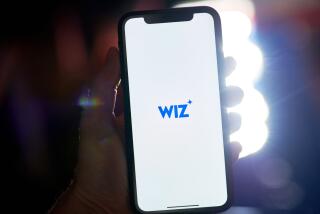Coke and Pepsi Proposals Face Close Scrutiny
- Share via
WASHINGTON — Coca-Cola’s planned acquisition of Dr Pepper, a bold move to counter PepsiCo’s pending takeover of Seven-Up, could force the Federal Trade Commission to stymie both soft-drink giants and block each merger, antitrust specialists say.
Noting that Coke and Pepsi together would command about 80% of the domestic soft-drink market if the mergers are allowed to proceed, Capitol Hill sources forecast close scrutiny by two House subcommittees dominated by Democrats opposed to Reagan Administration antitrust policies as excessively pro-business.
The market concentration that would result from the Coke and Pepsi mergers would cause “real problems” and “probably could not pass muster under the guidelines,” a former government official closely acquainted with the evolution of the antitrust policies agreed Friday.
The takeover of Dr Pepper by Atlanta-based Coca-Cola, whose products now command a 39% market share, would put Coke in a dominating position if Dr Pepper’s current 7.1% market share were preserved. By contrast, a merger between Purchase, N.Y.-based PepsiCo and Seven-Up would vault Pepsi from a 27% market share to 34%.
“My guess is that the Coca-Cola-Pepper deal was more or less a threat to the FTC that, ‘If you don’t stop Pepsi, then we’ll force you to make a distinction between what they are doing and what we are doing,’ ” said the former government official, who declined to be identified.
Capitol Hill sources, generally critical of what they conceive to be Administration laxity on mergers, likewise saw in Coke’s move a ploy to force the FTC either to scotch Pepsi’s plans or to grant blanket approval to Coca-Cola’s even more daring grab for market dominance.
“If Coke did this to block the Pepsi merger, I believe they’ll succeed,” said one House staffer who spoke on the condition that he not be identified.
The two House panels with the most immediate interest in the announced mergers are the House Judiciary monopolies subcommittee, headed by Rep. Peter W. Rodino Jr. (D-N.J.) and the Energy and Commerce subcommittee on commerce, transportation and tourism, chaired by Rep. James J. Florio (D-N.J.).
Hearings Scheduled
Rodino, a heated opponent of the Administration’s plan to overhaul the antitrust laws, already has scheduled hearings in the next two weeks on the policies and operations of the Justice Department’s antitrust division.
The Administration proposal--codified last week--is certain to be a key topic, but sources said Rodino likely would hold back from any public inquiry into the soft-drink mergers while they are still under FTC scrutiny.
Likewise, Florio is planning to await FTC action before taking any steps on his own, sources said. Two years ago, the Florio subcommittee held extensive hearings in an attempt to block the General Motors-Toyota small-car plant in Fremont, Calif.
Under the Administration guidelines, a dominant market share resulting from a proposed merger could be offset if an industry were such that new companies could easily enter the market, thereby increasing competition. Partly because of that standard, the Administration has approved some large-scale mergers of airline companies--mergers that Rodino and Florio oppose on the more-traditional antitrust ground that largeness by itself is usually bad.
But ease of market entry does not appear to be a realistic factor in the soft-drink field, specialists said Friday. Indeed, the only ground on which the FTC could conceivably approve the Coke merger--and therefore, by extension, the Pepsi merger, since the two will likely be considered on similar grounds--would be a conclusion that “cola drinks make up an economic pocket unto themselves,” the former official said.
If the FTC took that tack, he explained, the soft-drink market could be subdivided between domestic and international and among cola, fruit and other subtypes. Moreover, he added, a major counterattack in Congress would be likely.
“But if that doesn’t happen,” he said, “there is no way you could save the Coke merger.”
More to Read
Inside the business of entertainment
The Wide Shot brings you news, analysis and insights on everything from streaming wars to production — and what it all means for the future.
You may occasionally receive promotional content from the Los Angeles Times.










